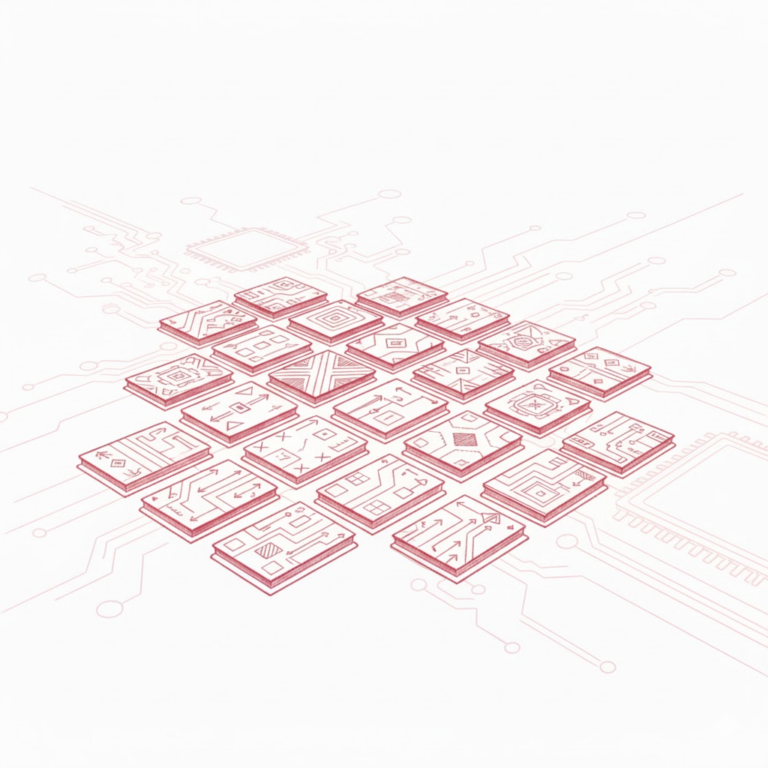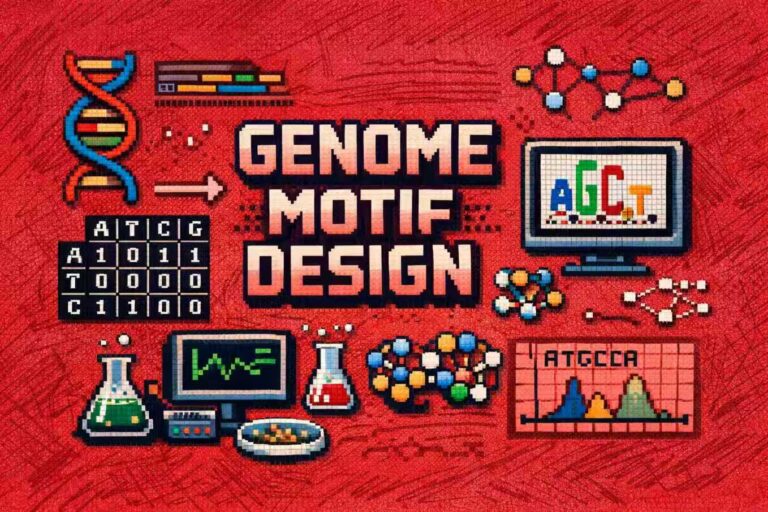Command Palette
Search for a command to run...
As GitLab Launches Geo-blocking, GitHub Talks About Borderlessness in China
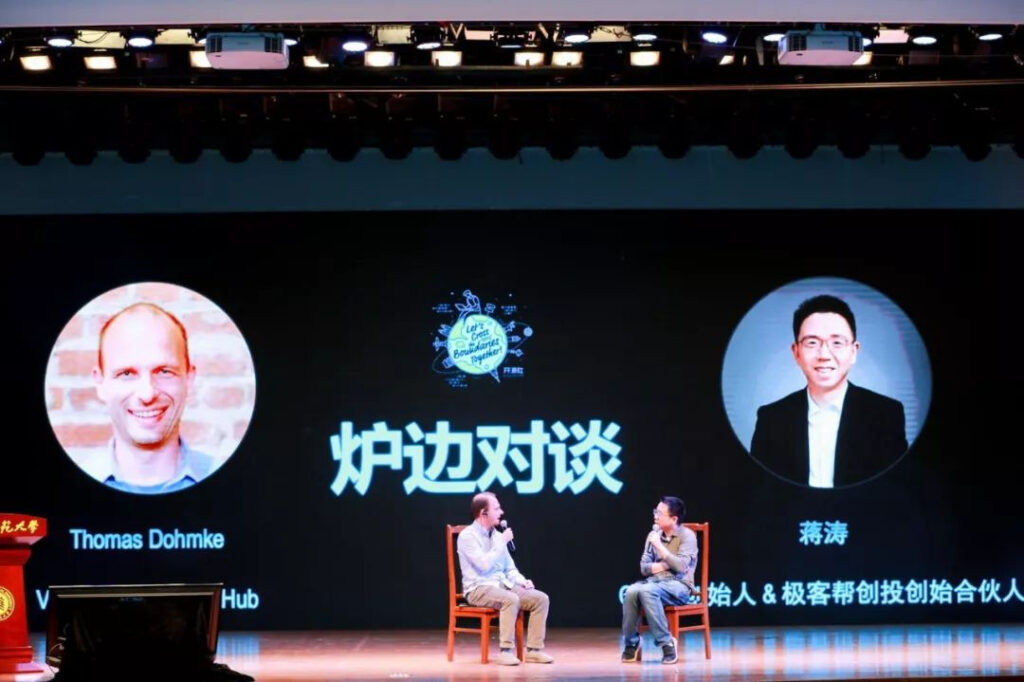
Today, GitLab released an announcement about geo-blocking, and China was included in the restricted list. At the China Open Source Annual Conference yesterday, GitHub Vice President Thomas Dohmke and CSDN founder Jiang Tao had a fireside chat. They had an in-depth discussion on the development of the technology community and open source, and talked about the issue of open source knowing no national boundaries. As two representative senior executives of the technology community, what sparks did their conversation spark?
Recently, GitHub's competitor, GitLab, the world's second largest open source code hosting platform, issued a statement on its official website, announcing a "blocking order", which caused heated discussion for a while.
The public statement said that in accordance with common industry practice under the current political situation, GitLab decided not to make offers to Chinese/Russian citizens, and employees with access to customer data are now unable to move to China or Russia.
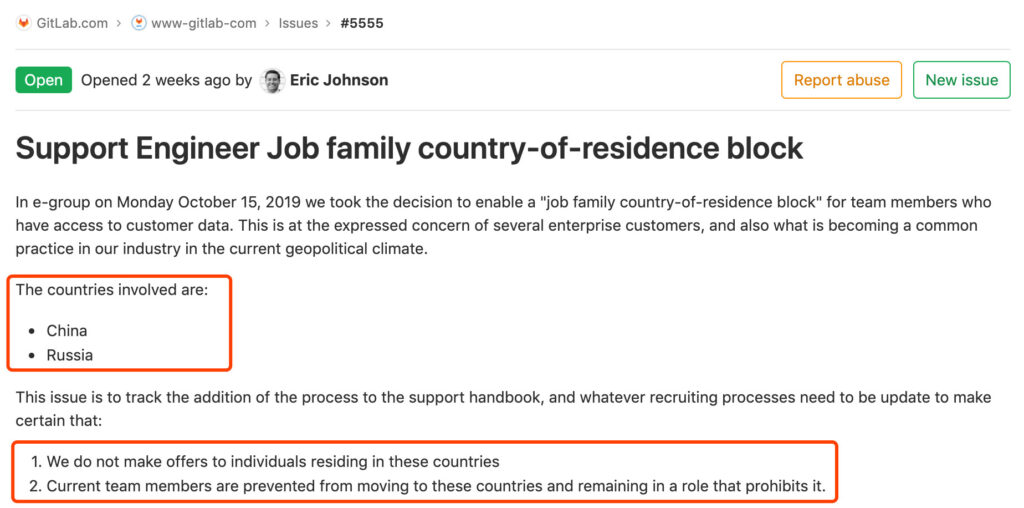
This statement even caused surprise among GitLab’s internal staff. Its global risk and compliance director also said: “I am confused. Why should these countries be listed separately? There is no law requiring us to do this, right?”
GitLab was developed by Ukrainian programmers. In September last year, they received $100 million in financing led by Google Ventures (GV), the investment arm of Google's parent company. This round of financing made the company's valuation exceed $1 billion. This move also gave GitLab some chips in the competition with GitHub.
But now, GitLab has publicly refused to accept engineers from China and Russia due to the "current political climate", which inevitably aroused everyone's doubts. Is it true that a team that claims to be diverse and global, and an open source code hosting platform that supports open source, also divides employees by nationality?
While the GitLab ban has sparked widespread discussion in the industry, its biggest competitor, GitHub, has chosen a completely different attitude in this regard.
A summit dialogue between Chinese and American programmer leaders
At the China Open Source Annual Conference COSCon'19 held yesterday, GitHub Vice President Thomas Dohmke and CSDN founder Jiang Tao discussed the development of open source from multiple dimensions. In their conversation, Thmoas showed his friendliness towards China, which was very different from GitLab's attitude.
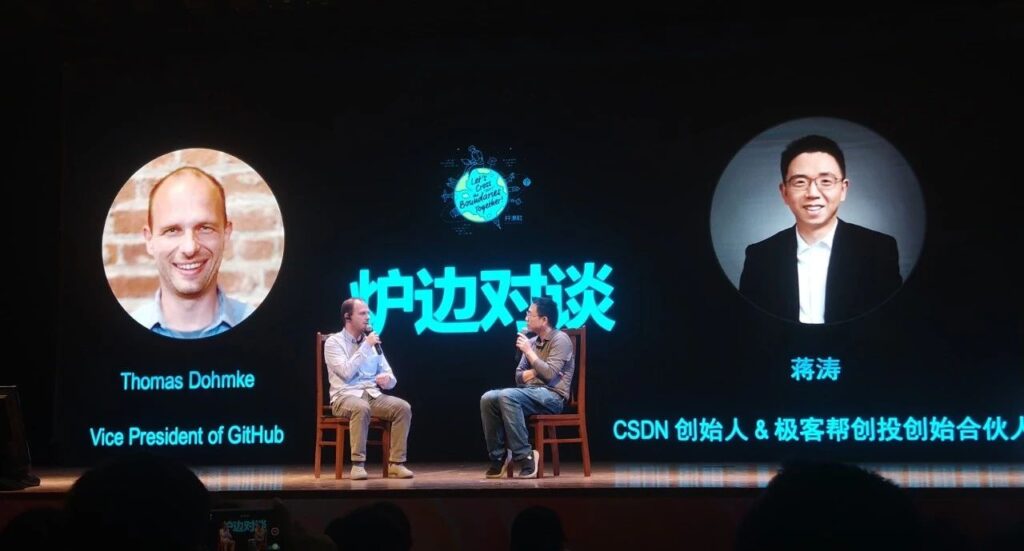
The conversation between the two covered many aspects, including personal experience, work experience, the development of GitHub, and the connection between GitHub and China. This conversation, which was full of practical information, became the most eye-catching part of this open source conference.
We have selected four topics to recreate this conversation and lead everyone to experience the collision of their ideas.
Guest Introduction
Thomas Dohmke is Vice President of GitHub, responsible for managing special projects, M&A, and international expansion. He was previously co-founder and CEO of HockeyApp, which was acquired by Microsoft in 2014. Thomas joined GitHub through the Microsoft acquisition and successfully completed the transaction phase.
Jiang Tao, founder and chairman of CSDN and founding partner of Geekbang Venture Capital, has 25 years of experience in software development. He has led the development of Giant Pen Computer, Kingsoft PowerWord and Super PowerWord.
Open source knows no borders, and GitHub will not be partitioned
Data shows that among GitHub's registered users, 20% are from the United States, and the remaining 80% are from other countries and regions. In addition, since 2015, the number of Chinese developers on GitHub has always ranked second, and is still growing at a rate of about 5% per year.
GitHub has seen an increase in the number of users and open source projects in China, and some information on GitHub has gradually become a reference indicator for many companies to examine new employees.
However, some users also began to engage in spam, ranking manipulation, and star buying, which cast a shadow on the Chinese development environment on GitHub. They discussed these issues as follows.
Jiang Tao: Because some Chinese developers pay more attention to brushing the rankings, not long ago, a European developer said that China now dominates the Trending Page; in this case, will GitHub carry out partitioning in the future?
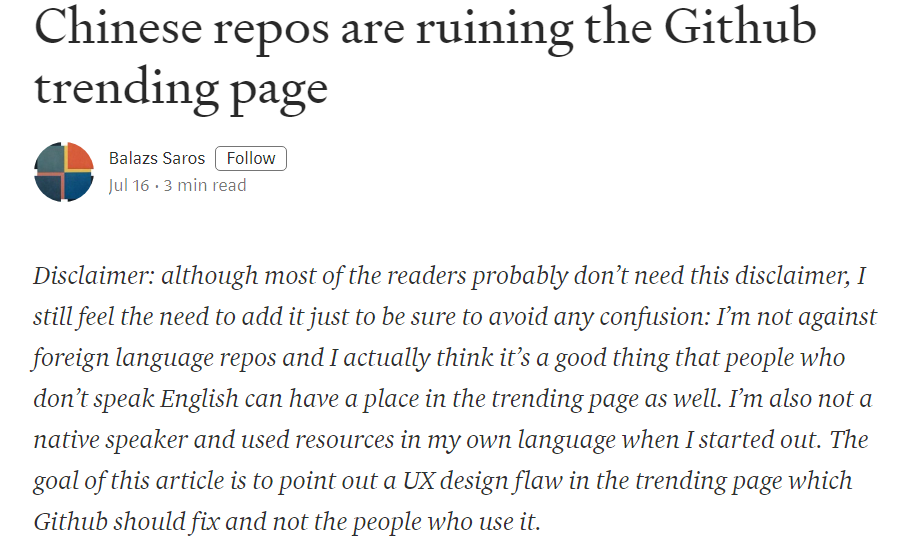
Thomas: I don't think so. This is actually a misunderstanding. The author of the article that caused discussion on the Internet at that time was not criticizing Chinese open source projects. On the contrary, the author just complained a few words because he couldn't understand Chinese.
Whether it is an open source project in China, the United States or Europe, it is likely to be maintained by developers from different countries and regions. Open source projects have no national boundaries or regional differences, which is a normal state of open source projects, so GitHub does not partition them.
Multi-language version: planned and in progress
In addition to misunderstandings, language differences can also limit technical communication. In response to this, many excellent websites or tools have corresponding language versions, such as Chinese versions of some communities or games. So will GitHub, which is gaining momentum, make changes for developers of different languages?
Jiang Tao mentioned that he had visited GitHub headquarters 7 years ago and had a discussion with the then GitHub CEO about the language version. He said that many Chinese developers love GitHub very much and are looking forward to the Chinese version of GitHub. In fact, it is not only Chinese developers. He also gave an example of Japanese developers who also hoped to solve the "language problem".

Jiang Tao: How will GitHub meet the needs of developers with different native languages?
Thomas: We have actually already started to take action on the language issue, for example, we have translated all of GitHub's own documents into multiple languages. Currently, most of the documents on the official website support simplified Chinese, Japanese, Spanish, Portuguese, etc. It can be said that we have taken the first step.
At the same time, GitHub also attaches great importance to cooperation with universities. In addition to providing points and bonus incentives for students who actively engage in open source careers, GitHub also supports school faculty and staff to teach through GitHub. In order to make it easier for Chinese students to familiarize themselves with and use GitHub, the official even launched a simplified Chinese version of all documents.
Blockchain: Encourage support, but no token issuance
For the development of open source, a difficult problem is how to make profits and continue to develop, so after some exploration, an open source software development incentive platform has gradually emerged.
For example, the relatively well-known Gitcoin is a tokenized open source collaboration mechanism. This platform uses blockchain technology to bring economic returns and rewards to the initiators, managers and contributors of community projects.

In addition, GitHub launched GitHub Sponsors some time ago and began to provide financial support to developers of open source projects on GitHub.
Jiang Tao: How can the incentive system of the open source community be better developed? Are there plans to provide further incentives based on blockchain? For example, will GitHub issue currency?
Thomas: We currently do not have any plans to develop blockchain directly. However, we are starting to encourage some behaviors, such as letting developers use our Sponsor system, and also encouraging them to use other payment systems based on public systems, blockchain platforms, etc.
By doing this, you can get the funding mechanism with just a click. This means that if you have a blockchain-related platform, you can get support from others by putting this URL into a specific file.
In the future, a sponsor button will be set up on the website and displayed on the page. When users click this button, they will not only see the sponsor, but also the corresponding funding information.
Internal management: Make good use of OKR and make flexible adjustments
From the above conversation, we have a deep understanding of GitHub's latest development trends. So what are the things worth learning from its internal management?
Currently, GitHub has more than 1,000 employees, 30% of whom are in San Francisco, and the rest are distributed around the world, some of whom choose to work from home. So for this largest code hosting and collaboration website, how do they measure and assess the quality of their employees' work?
Audience: Many companies set KPIs for product managers, so I would like to know what the KPIs of Github's product team are? Or to put it another way, to what extent can GitHub's products be considered successful?
Thomas: We are using a dedicated Objectives and Key Results (OKR) system, which was launched after the publication of the book of the same name.
In different teams, the product and sales departments also have their own set of standards.
At the company level, we also focus on financial data, such as revenue and profit contribution, and track the actual number of users per day and per month.

Therefore, the product team needs to find ways to improve these metrics. Compare active developers to the number of developers, and also track issues such as product releases and product satisfaction.
On a feature level, it’s important not only to consider the preview features at launch, but also to consider whether they can be rolled out on a large scale once introduced.
Limited dialogue can lead to unlimited thinking
During the fireside chat, the two had a conversation that lasted half an hour, and then had an in-depth interaction with the audience, adding a unique touch to this wonderful conversation.
The information contained in a conversation is necessarily limited, but the two heavyweight guests, with their insights in the industry, brought a rich storm of information and a feast of ideas to the conference.
But at the same time, this is just a microcosm of China's annual open source conference COSCon'19.
At this year's COSCon'19, hundreds of guests shared their ideas over two days, passing on those wonderful ideas to more people. These ideas and insights that carry the ideals of open source are like seeds, waiting to ignite a bigger flame at some point in the future.

-- over--



